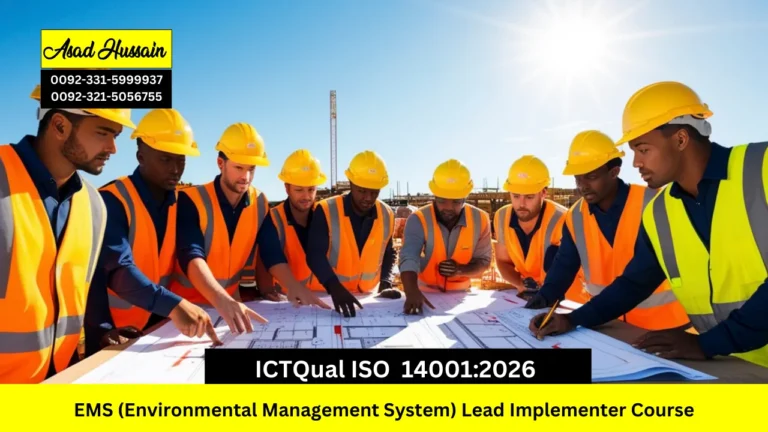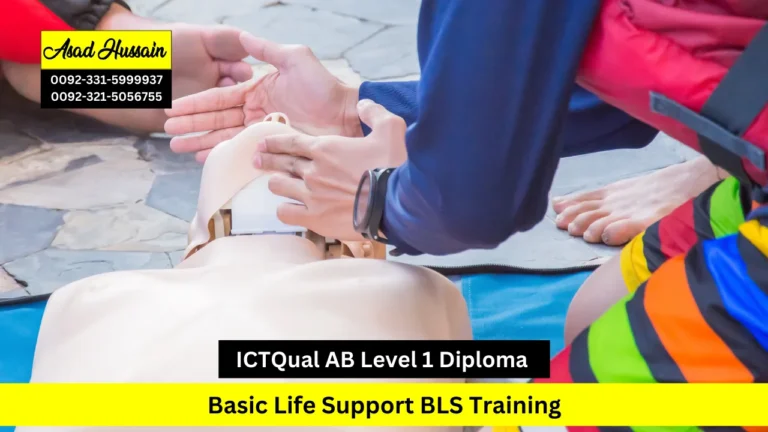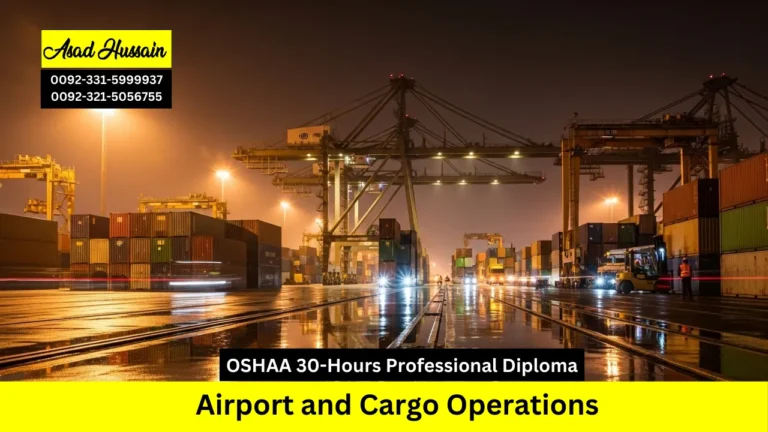The ICTQual International Level 3 Certificate in Airport, Airline and Aviation Management is an intermediate qualification designed to equip learners with the skills and knowledge needed to progress in the global aviation industry. Building on the foundations of Levels 1 and 2, this program introduces more advanced concepts in airport operations, airline services, and aviation safety, preparing students for supervisory and decision-making roles.
This certificate focuses on the strategic and operational aspects of aviation management, giving learners a deeper understanding of how airports and airlines coordinate to ensure efficiency, safety, and customer satisfaction. Topics include passenger experience, aviation regulations, ground operations, and compliance with international standards. By combining theory with practical insights, the course ensures learners are ready to handle real-world challenges in the aviation sector.
Designed for students, job seekers, and professionals, the ICTQual Level 3 Certificate is ideal for those aiming to move beyond entry-level roles and into positions of greater responsibility. It is also suitable for individuals already working in aviation who want to formalize their experience with a globally recognized qualification. With flexible learning formats, the course can be completed alongside work or further studies, making it accessible to a wide range of learners.
Upon completion, graduates will hold a globally respected qualification that enhances employability and opens doors to careers in airport operations, airline management, and aviation consultancy. It also serves as a pathway to higher-level qualifications, such as the ICTQual Level 3 Diploma or Level 7 Diploma in Airport and Airline Management. This certificate is a valuable step for anyone committed to building a long-term career in one of the world’s most dynamic industries.
Program Highlights
Mandatory Units
This qualification, the ICTQual International Level 3 Certificate in Airport, Airline and Aviation Management, consists of 3 mandatory units.
- Principles of Airline and Airport Management
- Aviation Safety and Regulatory Compliance
- Customer Experience and Service Quality in Aviation
Entry Requirements for ICTQual International Level 3 Certificate in Airport, Airline and Aviation Management
Age Requirement
- Applicants must be at least 16 years old at the time of enrollment
- Suitable for both school leavers and adult learners aiming to progress in aviation
- No maximum age limit, making it accessible to learners of all backgrounds
Educational Background
- Completion of secondary school education (or equivalent) is recommended
- Learners who have completed the ICTQual Level 1 Award or Level 2 Award in Airline, Airport, or Aviation Management—or an equivalent qualification—will benefit, though it is not mandatory
- Students with a strong interest in aviation, travel, or tourism are encouraged to apply
Work Experience
- No prior aviation work experience is required for this certificate
- Suitable for learners entering the industry for the first time
- Candidates with customer service, hospitality, or tourism experience may find the course especially valuable as it builds on transferable skills
Language Competence
- A good command of spoken and written English is essential, as the course is delivered in English
- Learners should be able to communicate effectively in classroom or online discussions
- Some providers may require basic English proficiency tests to ensure readiness
Learning Outcomes for the ICTQual International Level 3 Certificate in Airport, Airline and Aviation Management:
Principles of Airline and Airport Management
By the end of this unit, learners will be able to:
- Explain the organisational structures of airlines and airports, including key departments and their functions.
- Analyse the interrelationship between airlines, airports, and regulatory authorities.
- Demonstrate understanding of scheduling, route planning, and resource allocation in airline operations.
- Describe the principles of airport terminal management, including passenger flow and facility planning.
- Evaluate the importance of operational efficiency and cost control in aviation management.
- Apply basic management concepts to problem‑solving in airline and airport contexts.
- Recognise the role of leadership and teamwork in ensuring smooth aviation operations.
- Understand how technology and innovation are shaping modern airline and airport management.
Aviation Safety and Regulatory Compliance
By the end of this unit, learners will be able to:
- Identify international aviation regulatory bodies (e.g., ICAO, IATA, EASA, CAA) and their roles.
- Explain the key safety standards and compliance requirements in aviation.
- Demonstrate awareness of safety management systems (SMS) and their application in aviation organisations.
- Recognise the importance of risk assessment and hazard reporting in maintaining safety.
- Apply knowledge of emergency procedures and crisis management in aviation contexts.
- Evaluate the impact of non‑compliance on airline and airport operations.
- Understand the role of audits, inspections, and continuous monitoring in aviation safety.
- Appreciate the importance of a safety culture in sustaining passenger confidence and operational reliability.
Customer Experience and Service Quality in Aviation
By the end of this unit, learners will be able to:
- Explain the importance of customer service in building airline and airport reputation.
- Analyse the passenger journey from booking to arrival, identifying key service touchpoints.
- Demonstrate awareness of cultural sensitivity and inclusivity in customer interactions.
- Apply principles of effective communication and conflict resolution in aviation service delivery.
- Recognise the role of technology in enhancing passenger experience (e.g., self‑check‑in, e‑services).
- Evaluate strategies for measuring and improving service quality in aviation.
- Understand how customer satisfaction impacts loyalty, profitability, and competitiveness.
- Develop approaches to balancing operational efficiency with passenger comfort and service excellence.
The ICTQual International Level 3 Certificate in Airport, Airline and Aviation Management is designed for learners who want to progress beyond entry-level aviation knowledge and prepare for supervisory or decision-making roles. It is suitable for students, job seekers, and professionals who are serious about building a long-term career in the aviation industry.
1. Students and School Leavers
- Learners who have completed secondary education and want to specialize in aviation
- Students aiming to progress from Level 1 or Level 2 aviation qualifications
- Young learners interested in airport, airline, or aviation management careers
- Those preparing for higher-level aviation studies or diplomas
- Students seeking a globally recognized qualification to boost employability
- Individuals passionate about aviation and eager to gain structured knowledge
2. Aspiring Airline and Airport Professionals
- Candidates preparing for roles in ground operations, passenger handling, or cabin crew
- Learners aiming for supervisory positions in airline or airport services
- Individuals who want to understand aviation safety, compliance, and regulations
- Those interested in customer service and passenger experience management
- People seeking international career opportunities in airlines and airports
- Beginners who want to transition into professional aviation roles
3. Travel and Tourism Learners
- Students enrolled in travel and tourism programs who want to expand into aviation
- Learners aiming to combine tourism knowledge with airline and airport operations
- Individuals preparing for careers in ticketing, reservations, or travel consultancy
- Tourism students seeking a competitive edge in the global job market
- Professionals in hospitality who want to diversify into aviation services
- Learners interested in international travel and aviation careers
4. Job Seekers and Career Starters
- Individuals looking for their first professional role in aviation management
- Job seekers aiming to strengthen their CV with a recognized qualification
- Candidates preparing for airline or airport recruitment processes
- Learners seeking practical skills for supervisory or customer-facing roles
- People interested in working in fast-paced airport environments
- Those eager to join one of the world’s fastest-growing industries
5. Career Changers
- Professionals from hospitality, logistics, or customer service moving into aviation
- Individuals with transferable skills who want to re-skill for aviation careers
- Workers seeking a new career path in a dynamic and global industry
- Mid-career professionals aiming to progress into supervisory roles
- People passionate about aviation but lacking formal qualifications
- Learners exploring aviation as a second career option
6. International Learners
- Students from around the world seeking a globally recognized qualification
- Learners aiming to work with international airlines and airports
- Expats preparing for aviation roles abroad
- Candidates interested in cross-cultural airline and airport operations
- Individuals seeking a qualification accepted by global aviation employers
- Learners wanting to understand international aviation standards
7. Aviation Enthusiasts and Future Leaders
- Individuals passionate about aviation who want to formalize their knowledge
- Learners curious about how airports and airlines are managed at a higher level
- People interested in aviation safety, compliance, and passenger experience
- Enthusiasts preparing for advanced aviation studies or management diplomas
- Those who dream of leadership roles in airlines or airports
- Learners motivated to turn their passion into a professional aviation career







